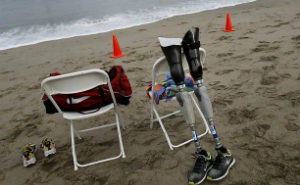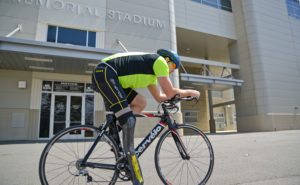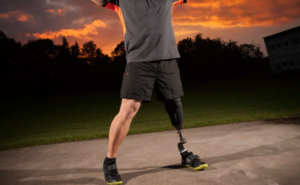Following your operation, you will have to adjust to life as a new amputee. This is a process that can be as much of a challenge as adjusting to life as a new amputee. With the proper self-care and support from others, however, your recovery does not need to be such a struggle.
Taking proper care of your wounds
Even with the best in prosthesis technology, the reality is that there will be post-operative tasks you need to make part of your new daily routine. Caring for your post-op wounds is one of these tasks. It is crucial to stay on top of this, as there is a right way and wrong way to care for these highly sensitive wounds. It is important to follow directions from your medical/prosthetic professionals as closely as possible.
The type and closure of the wound will, of course, depend on your amputation location and state of the limb at the time of surgery. The wound itself may close definitively during surgery or at a date to be determined. However, the wound will need care during the recovery process regardless.
Caring for the surgical wound as well as the skin of the residual limb is an important element of recovery. You want to promote healing of the underlying soft tissues. And you also want to reduce the risk of infection or treat any infections should they arise. Also, many individuals are given a drainage tube to remove fluids and aid in repairing of tissues, post-surgery.
You will need to change the dressings on any wounds, should they become soiled, show leakage, begin to come undone, or dislodged. Remember to start with clean hands, soap or sanitizer, or gloves, before you come in contact with the wound. You will need to learn how to properly wrap a wound with soft compression dressings (unless you currently have hard compression dressings in place).
Amputation injuries sometimes result in skeletal injuries to the limb left, so any pins or devises to maintain bone alignment or fracture healing will need to be sterilized as part of the cleaning.
Once you are preparing for definitive closure of the residual wound, your care for that wound will change slightly, as you also are preparing for prosthetics, should you go that route. Sutures will close the surgical wound and will need to be removed at some point in the recovery process. Gauze dressings should be changed twice daily. Adhesive strips will fall off naturally. Compression dressings aid in wound healing as they reduce swelling and prepare the residual limb for any prosthetics. Compression dressings or elastic bandages will need to be reapplied throughout the day to maintain compression.
Finally, you must begin to prepare the area for prosthetics, which means you must inspect the residual limb for any skin issues. Caring for your skin is crucial. Keep it clean by washing daily with soap and water and drying completely before applying any bandages or wraps. Dampness from sweat can be a haven for bacteria, which can lead to skin inflammation or infection. You want to avoid any potentially serious issues at all cost. Infections can become life threatening so it is crucial that you check that you skin with self-examination for redness, ulceration, tearing or other signs, twice a day.
Wound care tips
Notify your doctor of ingrown hairs, which can easily become infected in the area of a wound. Also, avoid shaving near the wound. Do not use lotions or creams on your wound, unless prescribed by a doctor. Use a doctor-prescribed sunscreen on your wound, should you be in the sunlight.
Be careful to avoid hot water, as your limb may have a sensitivity to temperature. It is also important to carry extra bandages, clothing, and wipes so you can change bandages when needed if you are out and about or traveling. If you experience pain during the process of cleaning of the wound, then you can establish a medication element that might help in pain management. You can also care for your wound with a good, nutritious diet, vitamins, and dietary supplements, to facilitate the healing process.
Should I choose prosthetics?
Once your residual limb is healing after amputation, you can begin considering prosthetics. This can be an exciting yet daunting process, as it is an additional step towards recovery and your new life as an amputee.
Horton’s O&P can help make this process easier for you. We can provide you information so you can make an informed decision about whether and what prosthetic would be right for your individual situation.
For more information
Take action that benefits your health. For any questions you may have about prosthetics, whether you are pre- or post-operative amputation and considering prosthetics, contact Horton’s Orthotics & Prosthetics at (501) 683-8889 to schedule an appointment.




Leave a Reply